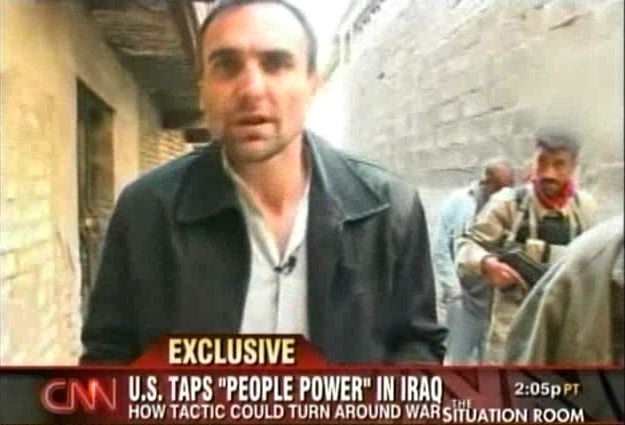TSR: Exclusive Report: Shia citizens stand up to the death squads

Length: 4:25
LARGE (51.8 MB) ----- SMALL (5.2 MB)
(NOTE: CNN International ran the same piece earlier in the day, and Délie grabbed as much of it as she could. The only difference is the lack of the banner graphic, so you can see a bit more of what is going on. Watch it here if you are interested: 45.7 MB)
WOLF BLITZER: Meanwhile, there's a new tactic in providing a glimmer of hope for the U.S. military mission in Iraq. The tactic is finding success where Iran's government -- Iran's government apparently has failed.
CNN's Michael Ware has an exclusive report from Baghdad.
(BEGIN VIDEO TAPE)
MICHAEL WARE, CNN CORRESPONDENT (on camera): Is this blood here?
UNIDENTIFIED MALE: Yes.
WARE (on camera): The blood is from one of the victims.
(voice-over): In yet another Baghdad torture chamber...
UNIDENTIFIED MALE: The blood on this end.
WARE: ...signs of the horrors within. But in the cooperation of these men, signs, too, of America's new hope for victory. For it was these Iraqis who put an end to the torture. A U.S.-backed militia with a difference.
(on camera): This is extraordinary. What we've seen happening in the Sunni community with Americans supporting new Sunni militias to drive out Al Qaeda and to stop Shia death squads we're now seeing in the Shia community for the very first time.
(voice-over): These men are from that community -- Shia fighters in Central Baghdad now battling the Shia Mahdi Army and death squads from other Shia factions.
(on camera): This is from the American Department of the Army.
(voice-over): And doing it all under contract to the U.S. Army. Their leader, Abu Fahad (ph), able to command 102 men and patrol the streets -- doing what the Iraqi government is not.
UNIDENTIFIED MALE: We find drugs and blood.
WARE (on camera): Really?
(voice-over): Bringing a sense of calm where there was none and delivering reconciliation by protecting families regardless of their religious sect -- which cuts to the heart of America's dilemma in Iraq. U.S. generals know military gains will be squandered without true reconciliation. The solution is people power, Abu Fahad tells me, with the bottom of the pyramid, he says, forcing change at the top.
REAR ADM. GREG SMITH, U.S. NAVY: And that's, I think, where the strength of Iraq it's going to find its foundation, is in the people itself.
WARE: People's mistrust in Iraq's government is widespread. Even Iraq's national security adviser worries about his own parliament.
MOWAFFAK AL-RUBAIE, IRAQI NATIONAL SECURITY ADVISER: There are a couple of member of council of representatives who were very, very close to the insurgency. And some of them, they were working intimately and helping the terrorists in this country.
WARE: Whatever the evidence, there's plenty of suspicion. In November, a car bomb was found at this prominent Sunni politician's home. His guards arrested. Another Sunni M.P. was detained for almost two months after a U.S. raid on an alleged insurgent meeting, though his staff maintained it was only a funeral. A third Sunni M.P. is now being hunted. He vanished when charged with an assassination attempt on a secular rival in which the target's two sons died. And a fourth Sunni M.P. has left Iraq -- accused of kidnapping 150 Shia and a role in the suicide bombing of parliament's cafeteria; claims he denies, yet he remains vehemently anti-American, branding the U.S. occupiers, the insurgency legitimate.
On the other of parliament, this powerful Shia politician fled to Iran this year, after CNN revealed he bombed the U.S. embassy in Kuwait in 1983. U.S. military intelligence officers suspect at least three other Shia politicians are tied to Iran's elite Revolutionary Guards Corps -- a unit the U.S. government classifies as a terrorist organizations. Local intel sources believe the number may actually be as high as 21. But for America, even one could be too many. U.S. patience is limited.
SMITH: And so much damage has been done to the trust and confidence of the average Iraqi in governance, in trusting the leadership.
WARE: Top U.S. officials are now taking a tougher line to prod Iraq's administration to deliver. As Admiral Smith warns, its window of opportunity could be closing, with the Western world's support at stake. Already, the U.S. is backing other players beyond the government -- like militia leader Abu Fahad.
Michael Ware, CNN, Baghdad.
(END VIDEO TAPE)
BLITZER: Solid reporting from Michael Ware -- an exclusive report.
Let's go to Jack Cafferty.
He's got The Cafferty File in New York -- Jack.
CAFFERTY: That guy is amazing.
BLITZER: Yes. That was a good report.
CAFFERTY: I mean he should win like all the Pulitzer Prizes and stuff for this work he does over there. It's unbelievable.
